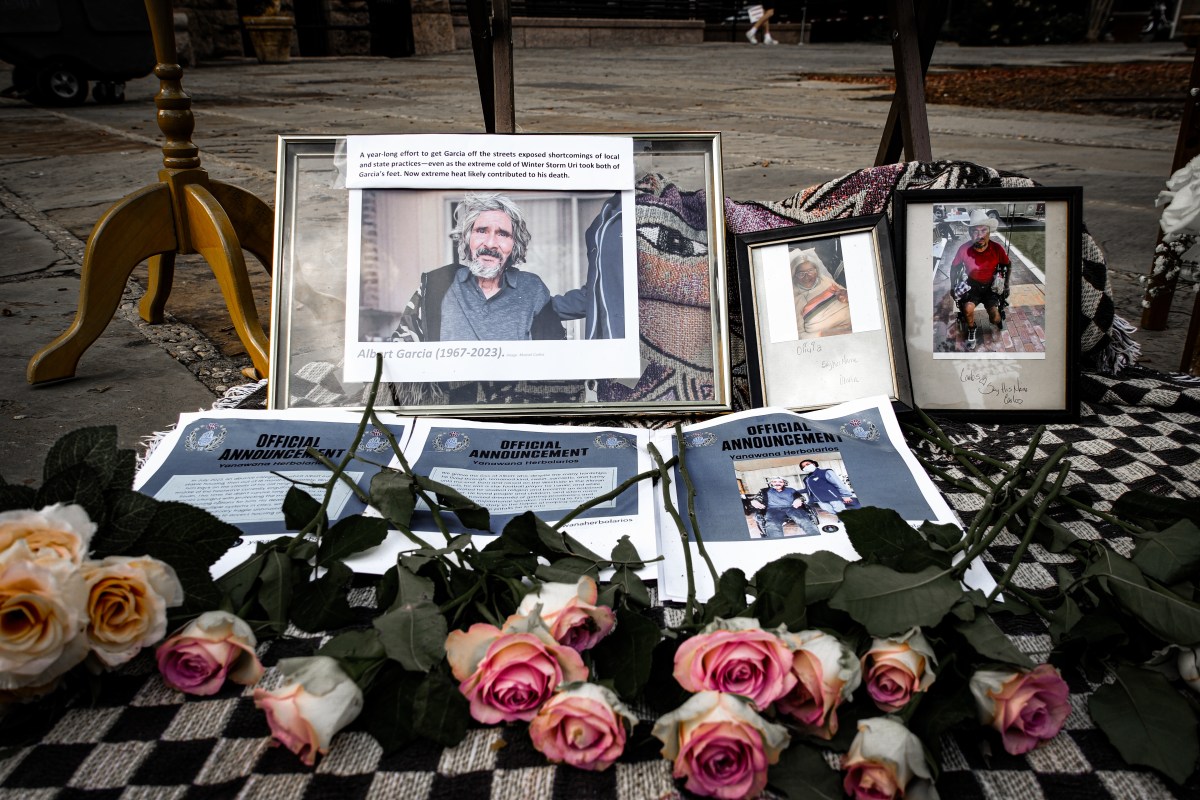Leer esta página en: Español
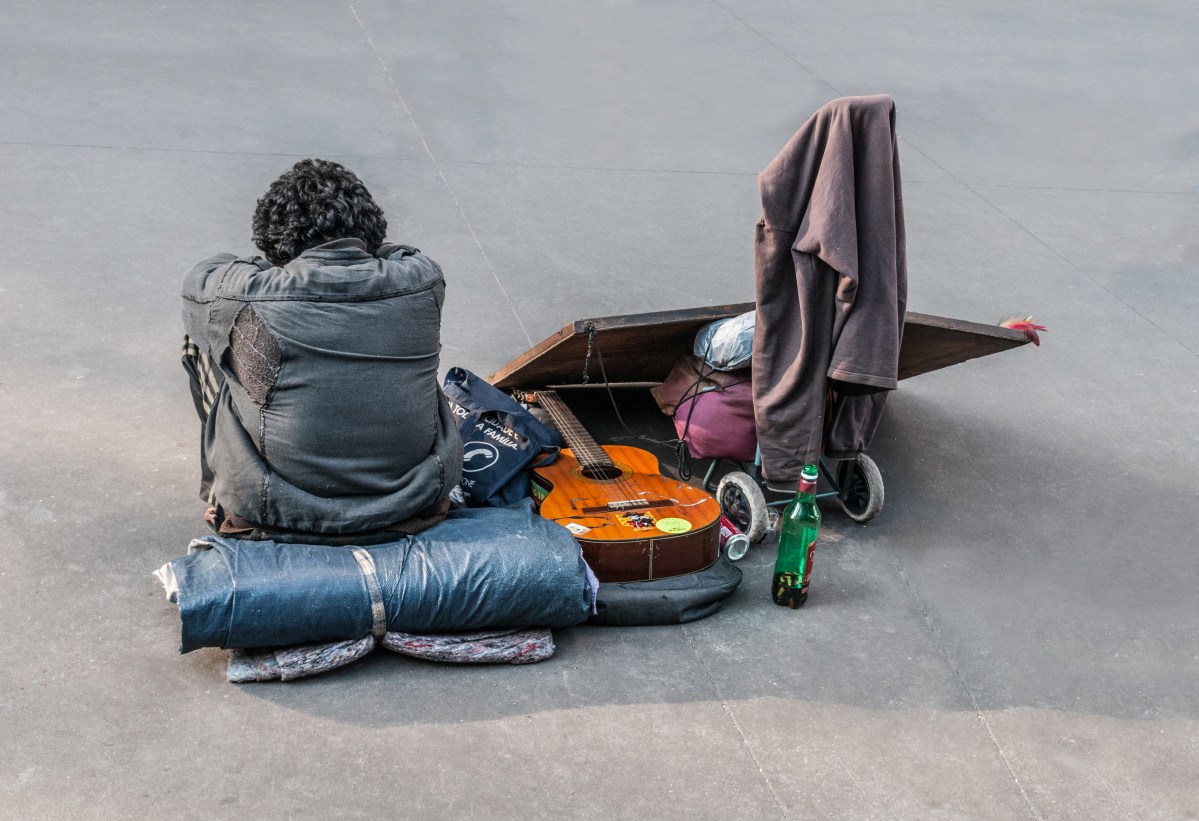
Abatements, or “sweeps,” of unhoused communities result in thousands of unnecessary deaths every year in the United States, a former City of San Antonio outreach worker writes.
The harms of these crimes are compounded by the acceleration of industrially driven climate change.
Nikketa Burges
During the seemingly endless slog that is summer in South Texas, the smell of cayenne pepper from the La Fiesta spice factory caustically mingles with engine exhaust, suspended and heavy in the suffocating humidity. In traffic, I creep slowly toward downtown through the vast skeleton of I-10, experiencing this stretch of my city as it was famously brought to the world in R.E.M.’s music video for “Everybody Hurts.” Hidden behind the on and off ramps, pylons, and retaining walls exists an often invisible slice of our community. This is where he died—alone. Again, my eyes well with tears.
Danny, a slight soft-spoken man in his early twenties, had approached me the weekend prior at the syringe exchange where I spent most Saturdays volunteering. (Deceleration agreed to the use of a pseudonym to maintain the subject’s privacy.)
“You’re the outreach worker. Can you help me get my ID?” he asked, softly, cautiously.
As the line began to swell, I’d hurried him through my station, agreeing to meet with him the coming week near his encampment to start the overly complicated ID recovery process. I never saw him again. Danny overdosed, tucked away from our line of sight, in the shadow of I-10.
Our team regularly distributed Naloxone—or Narcan, a drug proven effective in reversing opioid-related overdoses—to encampments in the area.
The City of San Antonio’s near-constant abatement of these encampments, however, led to the regular loss of life-saving and sustaining tools like Narcan among this group. For this reason, there was no Narcan in camp when Danny OD’d, and attempts to resuscitate were unsuccessful.
Moreover, Texas’s Good Samaritan Law, intended to allow bystanders to call 911 for an overdose without fear of arrest or prosecution, fails to protect people with a history of certain drug-related convictions or who have called 911 for an overdose within the past 18 months.

As such, Danny’s group, fearful of arrest, left him where he lay.
I wish I could say that Danny’s story is unique; sadly, it is not. Far removed from the sterility of the U.S. Army clinic where I cut my teeth, my days working for the City of San Antonio’s homeless outreach division of its Department of Human Services were spent navigating the epicenter of converging crises—historical and structural racism, the War on Drugs, and late stage capitalism—that led to Danny’s death.
More medic than outreach worker, I removed days-old bandages and scrubbed wounds and abscesses to re-bandage them, often with maxi pads when I ran out of non-adherent wound dressings.
Negotiating stigma, shame, criminalization, vicarious trauma, failing systems, and structural violence with these walking wounded, I would leave my clients with sterile syringes, cotton, tourniquets, cookers, water, alcohol prep pads, Band-aids, condoms—and Naloxone.
I’d arrived at this work from shared experience.
Leaving school with a 10th-grade education and never seeing my life as purposeful, my lived experiences of homelessness, poverty, drug use, sex work, foster care, child welfare systems, domestic violence, and sexual assault have all shaped how I show up both in this work and in the world.
RELATED: Albert Garcia’s Death Recorded as Drug Overdose by Bexar County Medical Examiner
At 28 years old I joined the U.S. Army, late by most standards, and as a medic found myself far more drawn to patients’ stories—the interlocking circumstances which produce disease—than to their bodily responses to trauma or illness.
Though conflicting with my values, the military offered me the privilege and subsequent purpose that comes from an education. It’s from this opportunity that, as a graduate student of medical anthropology, I’ve come to focus on what I saw in my own life and as an outreach worker: the health impacts of unsheltered homelessness and harm reduction.
Grounded in this research and the personal experience that has informed it, this writing is intended to honor those whom I serve.
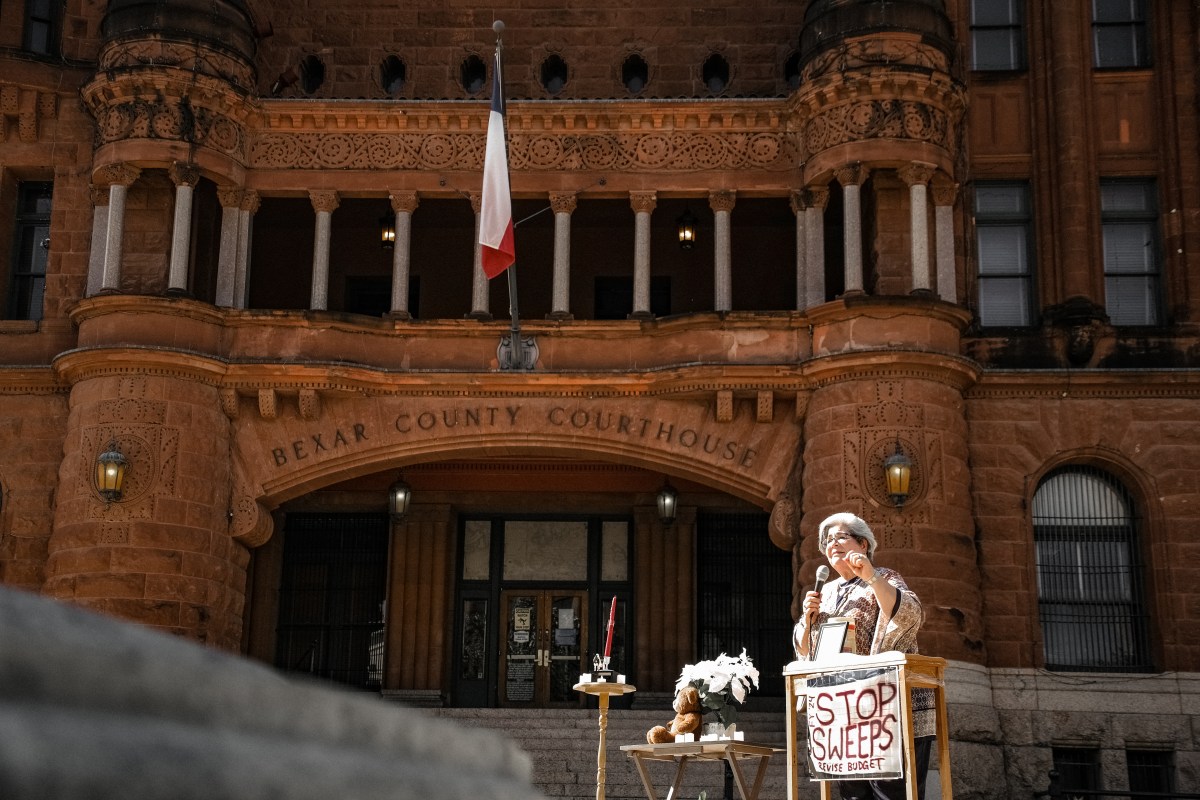
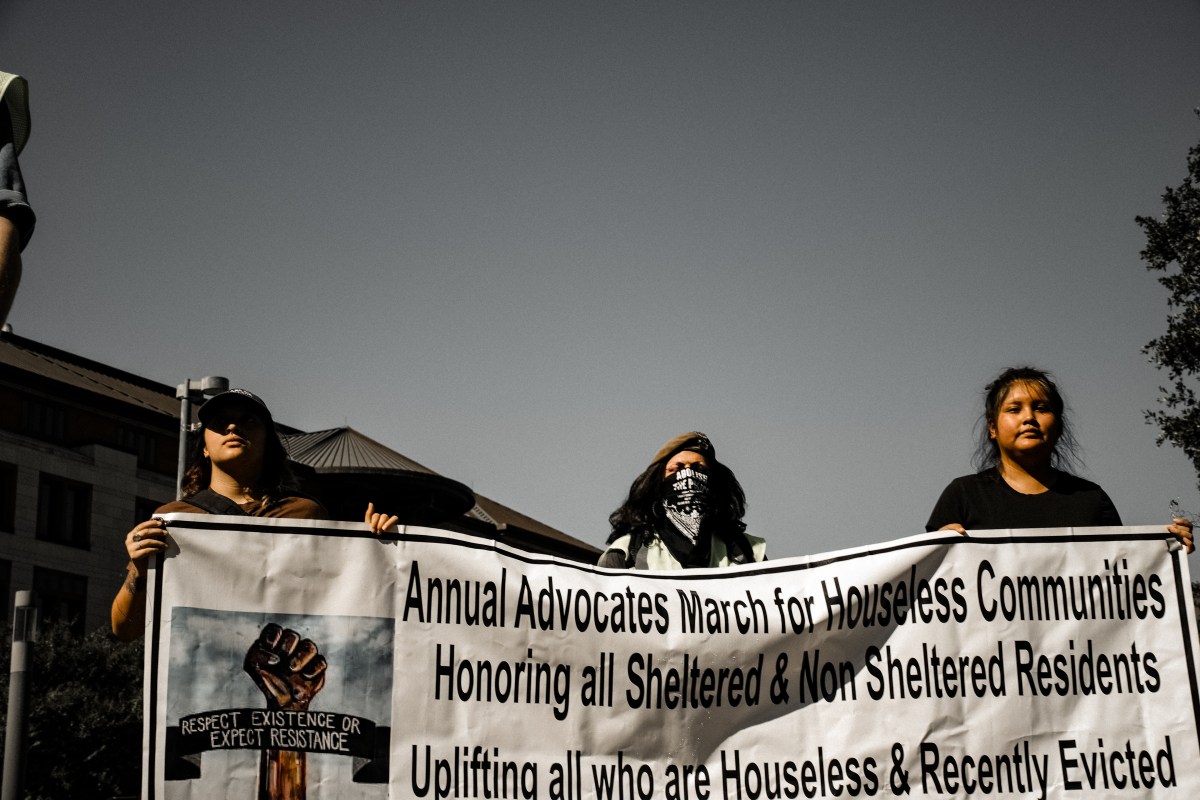
The Mortal Toll of Encampment Sweeps
Unsheltered homelessness is a growing crisis here in the U.S., with an estimated 653,104 individuals experiencing homelessness on a single night in January 2023, according to the U.S. Department of Housing and Urban Development’s Point-in-Time count. However, skepticism exists among researchers and those who work in homelessness services regarding the accuracy of this data, given that the count is done on a single night in January and is based on an in-person survey where volunteers are deployed to encampments that are subject to constant sweeps.
What the medical and social science research on unsheltered homelessness suggests is that, beyond just San Antonio, the visibility of homelessness has become fodder for politicians whose empty solutions are based more in criminalization than on research-based public health considerations.
Cities across the United States have adopted policies that target the unsheltered through what they euphemistically refer to as “encampment sweeps,” “abatements,” or “clean-ups,” practices legitimized through “quality of life crimes.”
These are ordinances which prohibit sitting, lying down, camping, living in one’s vehicle, panhandling, and other actions up for interpretation, all of which strike a distinctly anti-homeless tone as laws against loafing and loitering have long done.
Though they claim to be about health and safety, these policies have dire consequences for the health and well-being of those they displace—especially in a time of rapidly accelerating climate change driving extreme temperatures known to be especially deadly for those living unsheltered. For instance, a 2023 study published in the Journal of the American Medical Association by a team of public health researchers and houseless advocacy organizations highlights the dire health consequences of displacing people experiencing unsheltered homelessness, especially those who inject drugs.
In a simulation modeling study of 23 US cities, researchers found significant increases in overdose-related deaths, hospitalizations, and a decline in access to vital medications under policies of forced displacement.
More specifically, the study finds that involuntary displacement due to abatement policies would lead to as many as 2,175 additional overdose deaths. Under the same simulation, researchers likewise expect hospitalizations for injection-related infections to surge, with between 611 and 1,360 additional cases due to sweeps. Furthermore, displacement impedes access to essential resources like naltrexone and methadone—what researchers collectively refer to as Medication Assisted Treatment, or MAT—potentially resulting in thousands fewer initiations of these lifesaving treatments.
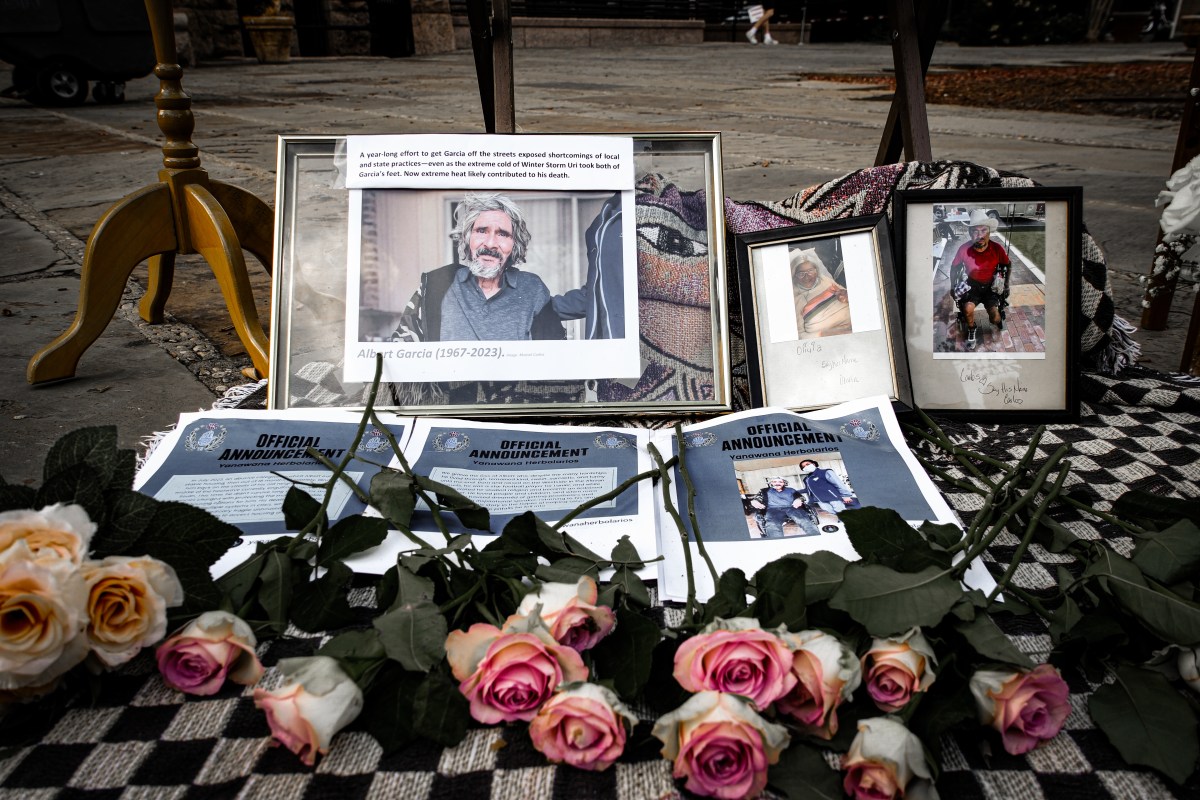
Similarly, a 2022 study based on in-depth interviews with unhoused people in Santa Clara County, California highlights the adverse health effects of encampment sweeps resulting in property confiscation, forced relocation to dangerous areas, and increased distrust in authorities. Here too, researchers argue that “abatement practices may be a key structural factor explaining the soaring numbers of people who are dying while unhoused,” noting that deaths of unhoused people in Santa Clara increased from 60 per year in 2011 to 203 in 2020. Another study of street sweeps from the perspective of health care providers emphasizes the way displacement policies impact material possessions and increase instability, which in turn affects access to crucial medications and exacerbates chronic health conditions.
What these studies underscore is the structural violence embedded in encampment sweeps. Rather than promoting the health and wellbeing of unhoused residents and wider public health, as city officials often claim, such policies in fact exacerbate health disparities among already-vulnerable populations, increasing morbidity and mortality, and increasing risks of diseases like HIV and hepatitis. These findings urge a reevaluation of local approaches to the increasing crisis of homelessness, emphasizing the need for holistic solutions that prioritize support services and address the lack of affordable and permanent supportive housing.
But as I witnessed firsthand during my tenure as an outreach worker for the City of San Antonio’s Department of Human Services (DHS), encampment abatement often occurs without providing immediate housing or resources for those affected. Marisa Westbrook and Tony Robinson, researchers at the University of Colorado at Denver, have underscored this reality, revealing that 80 percent of individuals forced to relocate by Denver anti-homeless policies were not offered supportive services. And as in the research cited above, Westbrook and Robinson likewise find that forced displacement only exacerbates morbidity and mortality, noting that the dismantling of individuals’ shelters leads to a 45 percent increase in weather or exposure-related injuries.
As we have already seen locally in extreme weather events like Winter Storm Uri and last summers record-shattering heat, climate change only increases this vulnerability for those who are repeatedly displaced. The head of SAMMinistries, a local nonprofit dedicated to reducing houselessness in San Antonio, told Deceleration recently that as many as half of the 322 unhoused residents who died in 2023 may have lost their lives—at least in part—due to that year’s unprecedented heat. The case of Albert Garcia and SAMMinistries’ recent assessment of heat’s role in increasing numbers of street deaths in San Antonio thus points to a deadly reality: not only does climate change impact unhoused communities first and most violently, but these impacts are then magnified by the demonstrated public health impacts of encampment sweeps.
The Quiet War on Homelessness: Militarized Social Services
As the country grapples with a surge in unsheltered homelessness, we see an equally concerning national trend toward what we might call the militarization of social services. According to sociologist Chris Herring in a study of “complaint-oriented policing,” the deindustrialization experienced by Western countries in the late 1970s and 1980s set the stage for the rise of a neoliberal economic system whose hallmark has been a gradual erosion of the welfare state.
This shift toward militarizing social services, coupled with austerity measures targeting social programs, resulted in a vast increase in unsheltered homelessness that continues to disproportionately impact BIPOC communities.
The City of San Antonio’s homeless outreach program is no exception to these nationwide trends. Initially staffed predominantly by male veterans, this program utilizes outreach workers in an attempt to legitimize abatements or sweeps, displacing the unhoused under the guise of providing social services, as scholars like Herring have documented.
This program often operates in concert with an approach Herring terms “complaint-based policing,” wherein community members utilize 311 or apps to report those living unsheltered to authorities and ultimately remove them from public space. Such practices have emerged in response to public resentment towards visible homelessness, leading municipalities across the US to implement “quality of life crimes” or “anti-homeless laws.”


Thus, contrary to public discourse we hear on encampment abatement from city leaders, what recent research highlights is the violent consequences of encampment sweeps, which are at best an ineffective tool to manage homelessness and, at worst, an act of deadly violence.
The absence of supportive services leads to increased morbidity and mortality among those living unsheltered, a finding that urges policymakers to prioritize compassionate and comprehensive approaches to address encampments, such as providing sanitation services—or, at the very least, stopping their unfounded claim that abatement policies are conducted to promote the health and wellbeing of those they target.
Someone I greatly admire once told me that this country doesn’t have human rights; we have civil rights. As I sit with this eviscerating truth, the web of cruelties that are anti-homeless measures—abatement, move-along orders, hostile architecture, drug war policies—begins to unravel.
All these components of structural violence work to exclude people not only from achieving basic health and dignity but ultimately from their place in civic life.
I write this miles away, both temporally and spatially, from my days spent working in outreach on San Antonio’s streets. I ultimately left my work in outreach without having secured employment and found my way to study at the University of Colorado Denver. My departure driven by a toxic work environment that was allowed, if not encouraged, because of organizational hostility to my vocal opposition against encampment sweeps.
Still, my guts churn at the thought of what my former clients might think of this writing, at the thought that I have abandoned my community for the comfort and distance of academia. At the risk of projecting my constant feeling of hopelessness, my fear is that all this writing, the countless emails to local officials, is ultimately a useless endeavor. It will not bring Danny back, nor the innumerable others who have languished and died before our eyes as a direct result of the cruelty of policy failures.
These deaths are a reminder, one that often violently bumps up against my self-righteousness, that no matter how well researched our writing, how well written or explained our emails to city decisionmakers, the real question remains: How do we reach into the chests of people and get them to give a fuck?
-30-
Nikketa Burges, of San Antonio, Texas, is a harm reductionist and person who uses drugs (PWUD). In 2024, she is enrolled as a medical anthropology graduate student in the Anthropology Department, University of Colorado Denver. Nikketa’s background consists of lived and work experience in the child welfare system, homelessness, and sex work. She worked as an army medic, outreach specialist for people experiencing homelessness for the city of San Antonio, and harm reductionist. She is both personally and professionally committed to culturally appropriate and compassionate care for PWUDs and their communities and ending the War on Drugs.
To hear personal stories of what has been lost in sweeps among unhoused residents in Albuquerque, New Mexico, we recommend the story published yesterday by Nicole Santa Cruz at ProPublica.

Like What You’re Seeing? Become a patron for as little as $1 per month. Explore ways to support our mission. Sign up for our newsletter (for nothing!). Subscribe to our podcast at iTunes. Share this story with others.

